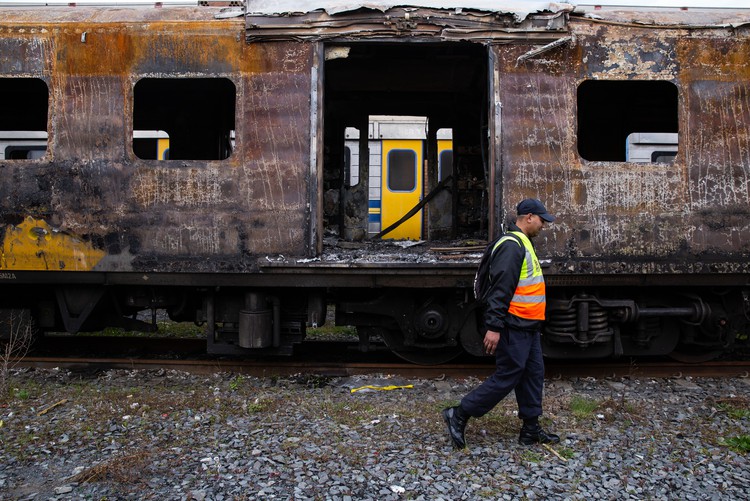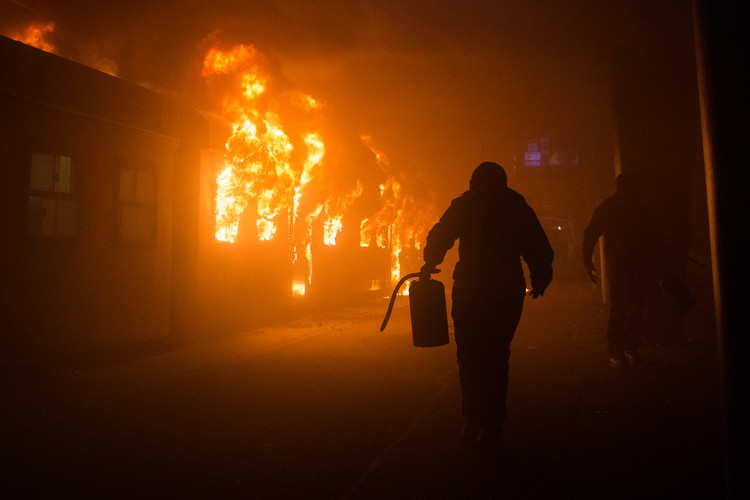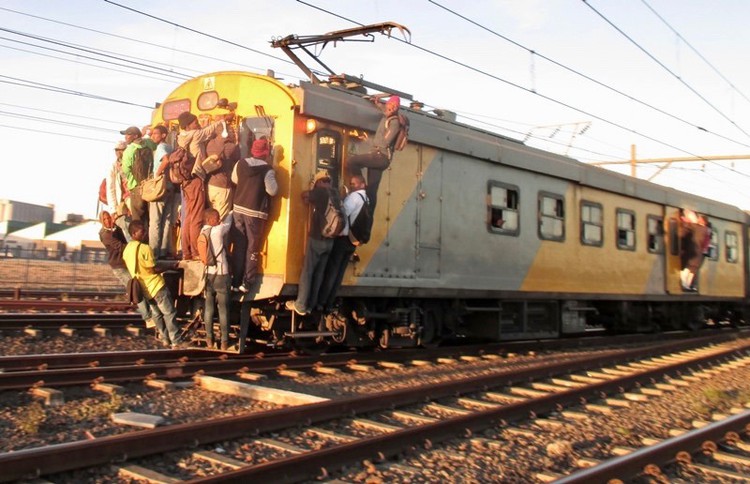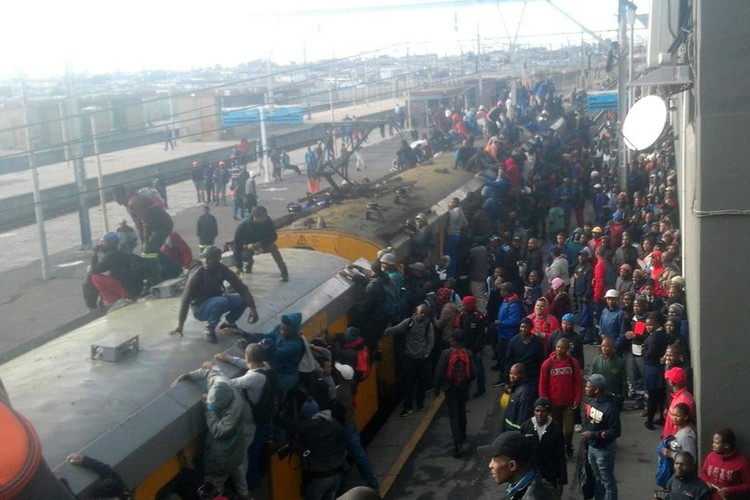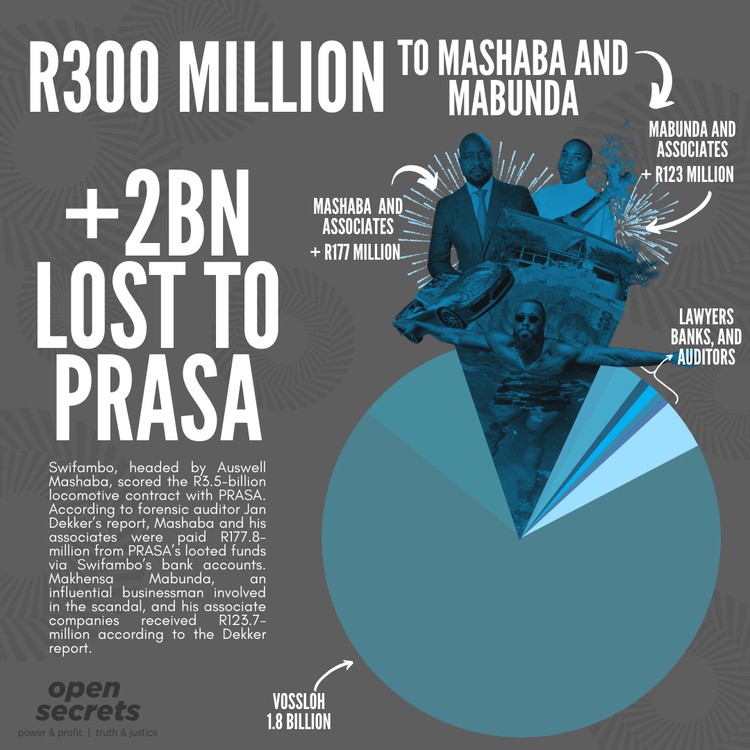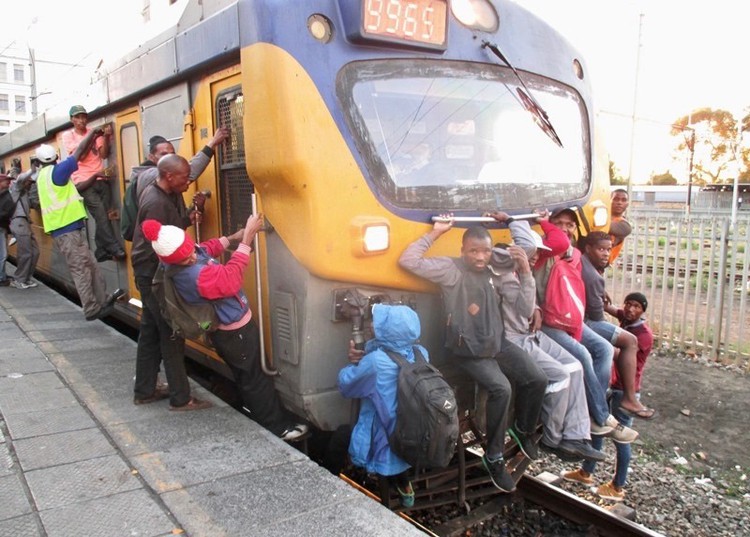The looters living it up from PRASA millions
Makhensa Mabunda and Auswell Mashaba were at the heart of the corrupt deals
Burnt out trains at the Paarden Eilend Depot in Cape Town. Archive photo: Ashraf Hendricks
This is the second in a series of articles on corruption in PRASA’s dealings with front company Swifambo Rail Leasing. It focuses on the activities of Makhensa Mabunda and Auswell Mashaba, the men who orchestrated the purchase of unusable locomotives for the Passenger Rail Agency of South Africa (PRASA).
Makhensa Mabunda is a man with a lavish lifestyle. His 1.2 hectare home in north Gauteng is valued at around R30-million. The design and décor of the mansion cost upward of R5-million. We know this because bank records revealed in investigations into PRASA’s corrupt contracts show the rail agency paid for upgrades to Mabunda’s home.
The investigations were undertaken by forensic auditors Ryan Sacks in 2017 and Jan Dekker in 2021. The Sacks investigation, commissioned by the Hawks, produced a draft report which was heavily relied upon by the Zondo Commission. The probe by Dekker was commissioned by Tshwane Trust, Swifambo’s liquidators, who have a number of claims against individuals and companies who received the proceeds of Swifambo’s corruption with PRASA.
Mabunda runs the Siyaya Group of companies which has a long history of bidding on PRASA contracts. Even before the deal in which front company Swifambo partnered with Spanish supplier Vossloh to supply locomotives to PRASA, Siyaya had already scored about R1-billion in PRASA contracts, according to a forensic investigation by law firm ENS.
A man tries to put out a burning train on Cape Town station. Archive photo: Ashraf Hendricks
After the Swifambo deal was struck, Mabunda and companies linked to him were paid R123.7-million, according to an investigative audit report commissioned by Swifambo’s liquidators, Tshwane Trust. The payments were made by Swifambo and its holding company Railpro.
In addition to these payments, Mabunda’s companies also received R89-million from Vossloh itself, in ten payments made between 2011 and 2015.
As reported in part one of this series, these payments were flagged in a 2017 report by the Reserve Bank and there are grounds to believe that they were kickbacks for Mabunda’s role in setting up the Swifambo/Vossloh deal with PRASA.
But the Mabundas continue to live in their luxury mansion in Waterfall Equestrian Estate.
At the Zondo Commission, Mabunda denied any involvement in impropriety. He told Open Secrets in March 2024 that the Commission “didn’t bother to call me back” after he made his submission.
Commuters hang on to a Khayelitsha-bound train in Cape Town. Archive photo: Mandla Mnyakama
Mabunda is currently under investigation, but in an investigation initiated by Spanish authorities. Authorities in Spain submitted a Mutual Legal Assistance request to the National Prosecuting Authority (NPA) for an investigation into Mabunda and others who benefitted from PRASA’s corrupt dealings with Swifambo, between 2012 and 2017.
Asked for comment by Open Secrets, Mabunda said he would only answer to a case put forward by the Special Investigating Unit (SIU) or the NPA. “I don’t deal with media,” he said. “I want to deal with the Hawks, the SIU or the NPA. I will respond to law enforcement. Whatever information you have, you can refer it to them, and I will respond to them if there is a case to answer.”
The Mashaba millions
Auswell Mashaba was the director of Swifambo when the Vossloh-PRASA locomotive contract was signed.
He and his family continue to rake in money from businesses they built partly off the millions illicitly diverted from PRASA.
In 2015 City Press revealed that Mashaba spent over R50-million on property after Swifambo received its first payment of R460-million from PRASA in 2013. This included R27-million which Mashaba spent on the luxury AM Lodge in Hoedspruit, Limpopo, paid for in cash. Mashaba resigned as director of AM Lodge, but his children — Nsovo and Njombo — were made directors of the company. A stay at one of the lodge’s luxury villas costs R38,000 per night, according to its website.
Commuters rush to board an overcrowded train at Nyanga Junction in Cape Town. Archive photo: Bernard Chiguvare
The money Swifambo received from PRASA was on the basis of a contract that the Johannesburg High Court and Supreme Court of Appeal (SCA) set aside because it was corrupt and irregular. In 2018, the SCA upheld a judgement by the Johannesburg High Court from 2017 which declared the PRASA’s contract with Swifambo corrupt. The courts found that Swifambo was a front company with no previous business history, and that the tender process had been riddled with irregularities to allow Swifambo to be awarded the contract.
Swifambo is currently under liquidation and has been in talks with PRASA to reach a settlement for money owed to the rail agency. However, the Mashaba family’s wealth has been allowed to grow.
In addition to the property, the Mashaba family controls the Mamoroko Makolele Trust, where Auswell Mashaba and his wife, Joyce, are the trustees. Four of their children — Nsovo, Akani Arnold, Njombo, and Xihanano — are the beneficiaries. According to a forensic report by auditor Jan Dekker, commissioned by the Tshwane Trust, Swifambo paid R85-million from the proceeds of PRASA funds into the family trust. At the time the report was written, in 2021, the Swifambo payments accounted for 78% of the total income in the account.
The Dekker report goes on to show that Swifambo also made 16 direct payments totalling just over R262,000 to Mashaba’s son Akani Arnold between February 2015 and November 2016. And Akani and his father benefited from Swifambo payments totaling R9.2-million paid to a company called Brightwave Technologies where both are listed as directors.
Swifambo also paid R19-million to the Mizana group of companies where Bekani Ephraim Mashaba serves as director. According to the Dekker report, Bekani Ephraim Mashaba is the brother of Auswell Mashaba.
In total Mashaba senior and the companies and people related to him were paid a staggering R177.8-million of PRASA looted funds through Swifambo’s bank accounts.
The Zondo Commission summoned Mashaba to appear in response to allegations of corruption regarding the Swifambo contract, but Mashaba refused. After the Zondo Commission released its final report, Mashaba launched a review application in court against the report and the summons which had been issued against him. The Commission’s lawyers, led by attorney Baitseng Rangata, filed a responding affidavit, but Mashaba has not replied to it. The matter will be heard in court in June.
An overcrowded train in Cape Town. Archive photo: Mandla Mnyakama
Tshwane Trust is taking legal action to recover funds from the directors of Swifambo, including Mashaba, and from at least five of Mashaba’s companies which received proceeds of corruption, including the AM Luxury business, for a total of over R90-million.
Open Secrets sent detailed questions to Mashaba and his son, Nsovo, over payments that the family received and used to benefit their businesses. They did not respond.
Photos from Nsovo Mashaba’s Instagram account. The left and right images are taken at AM Lodge. Copied as fair use
In February this year, the SIU made an announcement that it is investigating Swifambo’s contract with PRASA. The SIU has been largely successful in holding perpetrators of corruption to account, particularly while the Hawks and NPA have faced criticism for their failures to investigate and prosecute state capture cases.
Like Mabunda, Mashaba’s empire was built with help from corruption. And to date, these two men have yet to answer for what they stole.
Meanwhile banks and auditors turned a blind eye to the money flushed from PRASA into the pockets of greedy and powerful figures. Our next article in this series will look at the auditors and banks who enabled the looting of Prasa.
Support independent journalism
Donate using Payfast

Don't miss out on the latest news
We respect your privacy, and promise we won't spam you.
Next: Gauteng bid to gag civil society fails in court
Previous: Housing activists frustrated by President Ramaphosa’s six-month silence on public land act
© 2024 GroundUp. This article is licensed under a Creative Commons Attribution-NoDerivatives 4.0 International License.
You may republish this article, so long as you credit the authors and GroundUp, and do not change the text. Please include a link back to the original article.
We put an invisible pixel in the article so that we can count traffic to republishers. All analytics tools are solely on our servers. We do not give our logs to any third party. Logs are deleted after two weeks. We do not use any IP address identifying information except to count regional traffic. We are solely interested in counting hits, not tracking users. If you republish, please do not delete the invisible pixel.

